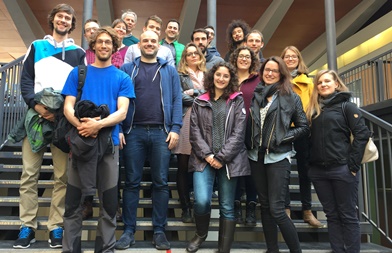Dates: 13th - 17th October 2017
Location: UPMC, Paris, France
Local organisers: James Orr, Bertrand Guenet and Philippe Ciais
-----------------------------------------------------------------------------------


TW2 group photo and practical session photo
Summary of the workshop:
The workshop “Regional to global modeling” in Paris, organized by Bertrand Guenet and James C. Orr from IPSL-LSCE, was aimed to give participants a first and comprehensive overview of climate modeling at a global scale. In order to achieve this, the workshop included expert lectures and practical sessions about the ocean model NEMO-PISCES and the land-surface model ORCHIDEE. After obtaining “our” first (prescribed-) model results, another series of lectures and a whole day of practice introduced the students to several tools (Jupyter Notebooks, Ferret, CDO and NCO), which allow for a smooth analysis of model results.
The first day of the workshop began with a lecture by Pierre Friedlingstein about the feedback analysis introduced by Hanssen et al. (1984), one of the advantages of theoretical climate models compared to observations and showed the direction in which the workshop was heading. Afterwards Laurent Bopp explained the ocean circulation and biogeochemical model NEMO-PISCES to the participants. The explanation of the different functions as well as the limits of the model were helpful for the coming analysis. The next morning Philippe Peylin introduced the land surface biogeochemical model ORCHIDEE. The workshop provided a practical session for each of these models, which took place over two consecutive afternoons (Tuesday and Wednesday). During these sessions the participants downloaded, compiled and ran the model. Thanks to the help of the session coordinators everyone could look into the code with some understanding of model functionality.
The sessions and lectures during the first three days were interrupted by lectures that introduced the students to different languages, reanalysis tools or data structures, which help or are necessary for model output analysis: Unix, Jupyter Notebooks, Ferret, netCDF, CDO and NCO. These sessions were strongly appreciated by the participants of the workshop as they turned out to be useful for the impending practical work as well as for their own core research. On top of it they gave a nice break from the more complicated science sessions and allowed everyone to ‘breathe’ for a while.
The workshop ended by applying actively all these new methods to CMIP5 (Coupled Model Intercomparison Project Phase 5) models. The students performed the feedback analysis introduced by P. Friedlingstein’s lecture at the beginning of the workshop and could practically apply their new technical skills. The interpretation of the obtained results on Friday turned out to be analytically interesting and to the point, which can be attributed to students’ understanding of the models themselves.
Overall the workshop was greatly appreciated by all participants and was therefore a success. The amount of lectures, practical work and discussions was well tuned to the existing abilities of participants, and the planning for, and alternation between science lectures and those introducing analytical tools, as well as practical sessions gave everyone the chance to absorb as much information as possible.
written by Jens Terhaar and Simon Bowring
List of the participants:
1. Jo Snöälv (ESR3 - C-CASCADES) - UNEXE
2. Andreas Androulakakis (ESR7 - C-CASCADES) - DELTARES
3. Domitille Louchard (ESR8 - C-CASCADES) - ETHZ
4. Jens Terhaar (ESR9 - C-CASCADES) - CNRS-IPSL
5. Matteo Puglini (ESR10 - C-CASCADES) - MPG
6. Adam Hastie (ESR11 - C-CASCADES) - ULB
7. Andre Nakhavali (ESR13 - C-CASCADES) - UNEXE
8. Simon Bowring (ESR14 - C-CASCADES) - CNRS-IPSL
9. Christel Van Eck - ULB
10. Alice Lebehot - University of Exeter
11. Hazel Vallack - University of Bristol
12. Markus Adloff - University of Bristol
13. Mathias Aschwanden- ETHZ
14. Patricia Silva - University of Lisbon
List of lecturers:
- Dr. Pierre Friedlingstein (UNEXE): Carbon-climate feedback analysis: β and γ
- Dr. Laurent Bopp (IPSL): An ocean biogeochemical model
- Dr. Philippe Peylin (IPSL): land surface biogeochemical model
- Patrick Brockmann (IPSL): iPython Notebooks / A tool for model & data analysis: Ferret
- Dr. Anne Cozic (IPSL): Unix commands to manipulate files, explore data & work with models
- Dr. Cathy Nangini (IPSL): An effective structure for slides in oral presentations
- Dr. James Orr (IPSL): Common format to store model data: netCDF
- Dr. Christian Ethé (IPSL): Download, compile & run NEMO-PISCES model on 1 grid cell
- Dr. Sabine Radanovics (IPSL): Tools to manipulate model output: CDO and NCO
- Dr. Josephine Ghattas (IPSL): Download, compile & run ORCHIDEE model on 1 grid cell
- Dr. Bertrand Guenet (IPSL): Run PISCES & ORCHIDEE under 3 scenarios / Compute regionally varying β and γ from CMIP5 output